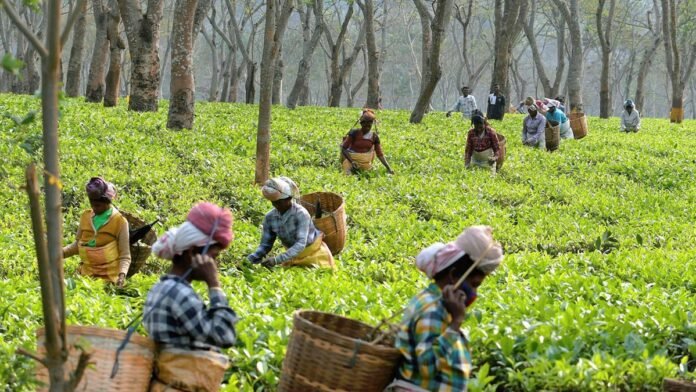The central government has approved the inclusion of Assam’s tea estates in the National Mission on Edible Oils – Oil Palm (NMEO-OP), responding to an appeal from the industry. This decision marks a significant shift in the state’s agricultural landscape, with tea planters now diversifying into oil palm cultivation. Officials confirmed that the scheme aims to reduce India’s dependence on edible oil imports while providing tea growers with an additional source of income.
Tea estates in Assam have faced fluctuating production levels due to unpredictable weather and rising input costs. The government believes that oil palm cultivation will provide economic stability to estate owners and workers alike. Authorities have assured that the new initiative will not compromise the tea industry’s legacy but will instead supplement its revenue streams. Experts predict that oil palm plantations will help Assam strengthen its position in India’s edible oil sector.
Industry leaders have welcomed the move, stating that it will boost employment opportunities and enhance productivity in the state. The Assam Branch of the Indian Tea Association (ABITA) had earlier requested government intervention, highlighting the potential benefits of intercropping oil palm with tea. The government’s decision aligns with its broader strategy to expand domestic oil production, reducing the burden on imports.
Agricultural experts have pointed out that oil palm is a high-yielding crop that requires significantly less maintenance than tea bushes. Its cultivation offers a stable and long-term income source for planters, particularly in regions where tea yields have declined. Assam’s climate and soil conditions are suitable for oil palm farming, making the transition feasible for estate owners willing to diversify.
Environmentalists, however, have raised concerns over the potential ecological impact of large-scale oil palm plantations. They argue that extensive cultivation could lead to deforestation and water depletion. Some activists have urged the government to conduct a thorough environmental impact assessment before expanding oil palm farming in Assam. Government officials have assured that strict guidelines will be followed to prevent ecological damage.
The implementation of the NMEO-OP scheme in Assam will involve financial incentives for tea estate owners willing to adopt oil palm cultivation. Subsidies on seedlings, fertilizers, and irrigation systems will help farmers transition smoothly. Training programs will also be organized to educate tea planters on best practices for growing oil palm alongside tea. The state agriculture department has started identifying suitable estates for the pilot phase of the project.
Tea estate owners who have already experimented with oil palm cultivation reported promising results. A few planters in Upper Assam introduced oil palm trees alongside their tea bushes last year, and early indicators suggest that the model can be replicated successfully. These growers have seen additional earnings without compromising tea production. Their success stories have encouraged more estate owners to consider diversifying their crops.
The government has clarified that oil palm cultivation in Assam will not replace tea but will serve as a complementary agricultural venture. Authorities have emphasized that land earmarked for oil palm will primarily include underutilized areas within estates. Farmers have been advised to follow recommended planting guidelines to ensure sustainable growth. Officials have reassured the tea industry that the state’s rich heritage of tea production will remain intact.
Consumer groups have expressed interest in the initiative, stating that increased domestic oil palm cultivation could help stabilize edible oil prices. India imports a significant portion of its palm oil from countries like Indonesia and Malaysia. By producing more oil domestically, the government aims to strengthen self-sufficiency in edible oils, reducing the volatility of global market fluctuations.
Assam’s tea industry has undergone several transformations over the years, adapting to new challenges and market demands. The introduction of oil palm cultivation marks another step in this evolution. If implemented effectively, the scheme could improve the financial stability of tea estates while contributing to the nation’s edible oil supply. The coming months will determine how successfully tea planters integrate oil palm into their agricultural practices.
Government officials have started engaging with tea estate workers to address any concerns regarding the introduction of oil palm. Many workers depend entirely on tea production for their livelihood, and there are questions about how this transition will affect their employment. Authorities have assured that oil palm cultivation will create additional jobs rather than replace existing ones. Skilled labor will be required for planting, maintenance, and harvesting, opening up new opportunities within tea estates.
Agronomists are studying the best methods for intercropping oil palm with tea to ensure both crops thrive without depleting soil nutrients. Some researchers believe that controlled integration of oil palm with tea plantations can improve land utilization without causing harm to existing tea bushes. Initial experiments have shown that with proper spacing and irrigation management, the two crops can coexist successfully.
Tea estate owners participating in early trials have reported that oil palm plants adapt well to Assam’s climate, but they require careful water management. Unlike tea bushes, which can endure periods of low rainfall, oil palm trees need consistent irrigation to maximize yield. The government has proposed installing drip irrigation systems in selected estates to maintain optimal growing conditions for both crops.
Local cooperatives are being encouraged to play a role in oil palm processing and distribution. Assam has a strong cooperative culture within the tea industry, and experts believe similar structures can be developed for oil palm farmers. The government is exploring the possibility of setting up small-scale processing units near tea estates to ensure efficient extraction and refining of oil from fresh palm fruit bunches.
With the first phase of oil palm cultivation set to begin later this year, the government plans to closely monitor its impact on the tea sector. Regular assessments will help ensure that the transition benefits both tea growers and workers. If successful, Assam could emerge as a key contributor to India’s edible oil industry while maintaining its reputation as a leading tea-producing state.

